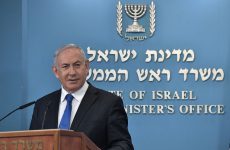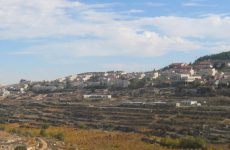Brig. Gen. Itay Brun: ‘Iran Has Nearly Half Of Enriched Uranium Required For Further Processing To Nuclear Weapons Grade’
‘Targeted Killings, Sanctions & Other Pressures Have Failed To Deter Iran From Advancing Nuclear Program’
Prime Minister Binyamin Netanyahu: ‘Israel Interested In Improving Relations With Turkey – I Will Reconsider Decision To Halt Tax Money To Palestinian Authority’
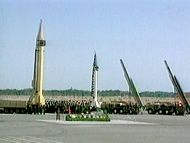
Iran is proceeding full steam ahead in her nuclear weapons program despite mysterious explosions at strategic sites, the killing of nuclear scientists and international sanctions. In a closed door briefing to the Knesset Foreign Affairs & Defense Committee, the IDF’s Bri.Gen. Itay Brun disclosed latest details on Iran’s nuclear project. Also appearing at the session, Prime Minister Binyamin Netanyahu said tougher sanctions could be imposed on Iran without the agreement of Russia and China.
In spite of assassination attempts …
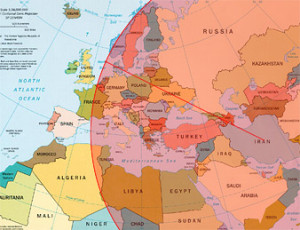
Iran has produced nearly 100 kilograms of 20% enriched uranium – she requires 220 kilograms to further enrichment to 90% weapons grade that would be sufficient to build one nuclear weapon. Those figures came from Brig. Gen. Itay Brun, the chief of the Research Unit of the the IDF’s Intelligence Branch. (Israeli intelligence has concluded that Iran has the technological capability to upgrade to 90%, the Iranian leadership has only to give the green light). Iran has some 8,000 centrifuges for uranium enrichment – 6,000 of them were operating.
Overall, the Iranians have a stockpile of some 50 tons of low grade enriched uranium. The intelligence officer added: ‘In spite of the assassination attempts and her sagging economy, Iran is still advancing on her nuclear program’. He referred to the huge explosion at the main missile site that killed seventeen Iranians, including the chief ground to ground missile expert. Although the blast may have delayed work at the facility or put it out of action, Iran has similar installations elsewhere.
Netanyahu calls for new sanctions outside the UN …
Prime Minister Binyamin Netanyahu told the committee that the latest IAEA report had proved Iran’s intention of producing nuclear weapons. What could be done in the face of the stiff opposition of Russia and China to stiffer UN sanctions? In effect, Netanyahu called for new sanctions to be imposed outside of the UN Security Council where Moscow and Beijing have threatened to cast their vetos.
Arab upheavals & Israel…
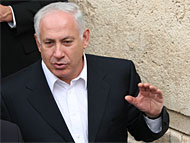
(Photo: Amit Shabi)
The PM declared: ‘There is only one certainty in the Middle East today, what was will not longer continue to be!’ Therefore it was difficult to foresee what will become of the weapons systems in the states of upheaval. (Libyan army weapons are known to have been recently smuggled into Gaza).
After the U.S. withdrawal from Iraq, Iran was establishing a strong presence in that country. Netanyahu hoped to stabilize the political situation with Egypt however he had no illusions saying: ‘ I don’t foresse the same intimacy with the new administration in Cairo’. His conclusion was that Israel could not base her security on peace agreements because agreements could unravel’. The current instability in the region posed greater security threats to Israel and that necessitated a reassessment of security needs. For example, this entailed more Iron Dome missile defense batteries and intelligence gathering. His comments seemed to end any talk about cuts in the defense budget.
Assad’s days are ending…
Syria: IDF intelligence estimates that President Bashar Assad’s days are ending. The number of civilian and military casualties has now reached 200 to 300 fatalities every week. In fact, the bloody clashes have induced Hamas to consider moving its headquarters from Damascus to another location in the Middle East.
Hamas planning to rocket Tel Aviv?
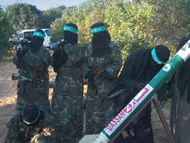
Meanwhile in Gaza Hamas was preparing for a new round with Israel. Brig. Brun disclosed that Hamas is developing ground to ground rockets with a range of 70 kilometers that could reach the city of Tel Aviv. Hamas was trying to build a production capacity similar to the short range Qassam rockets that have wreaked havoc on Israeli towns and villages adjacent to Gaza.
In Netanyahu’s view, Israel has thwarted the Palestinian Authority strategy to bypass direct peace negotiations by seeking unilateral recognition at the UN. ( This in violation of the Palestinians peace commitment in the Oslo Accords). In the PM’s words: ‘We acted to show the Palestinians there was a price to pay for their UN gambit and now President Mahmoud Abbas has backed off”. Abbas failed to achieve the required nine member majority in the Security Council. And therefore the U.S. veto was not necessary. In retaliation to the unilateral Palestinian moves and so-called reconciliation between Abbas and Hamas, that openly calls for Israel’s destruction, the Israeli government decided to violate its commitment to transfer tax money to the Palestinian Authority. However Netanyahu said he would reconsider this decision if the Palestinians desist from their unilateral steps at the UN.
On this score, Foreign Minister Avigdor Lieberman is categorically opposed, charging that this money would also be going to Hamas. Netanyahu told the committee that the recent meting between Abbas and Hamas chief Khaled Meshaal was more ceremonial than a true unification. In any event, Israel’s goal was direct negotiations with the Palestinians without prior negotiations.
Next, Jordanian security fence…
Demonstrations in Jordan were also posing a challenge to King Abdullad who actually rules over a Palestinian majority. In any case, after the completion of Israel’s security fence along the Egyptian frontier the PM said he would order the building of a security fence in the Arava to prevent infiltrations from Jordan.
Moderate dispute with Turkey…
One of the biggest headaches in the PM’s geostrategic briefing was the tension with Turkey, a former Israeli ally. Netanyahu said: ‘We must find ways to moderate this disupte. In light of the regional situation, Israel and Turkey have joint interests. He noted that Turkey had sent help to quell the disasterous Carmel fire last year and Israel had later offered to send rescue workers to search for victims in Turkey’s earthquake. Netanyahu concluded that he was not interested in the tension between the two states.



